America's Heroes
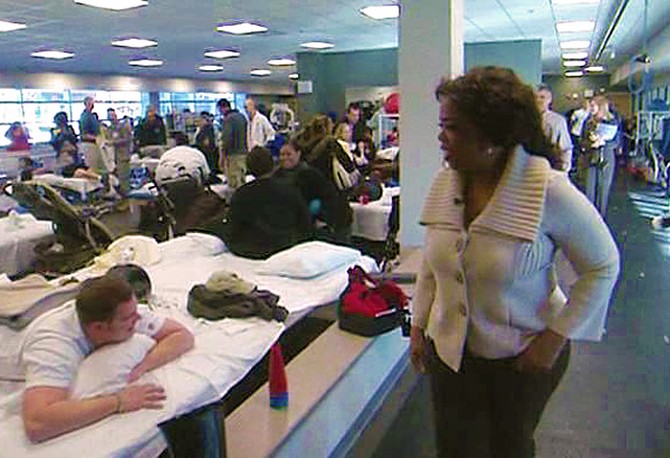
What if you woke up to find that you would never hold your child in your arms again? Never throw a baseball with your son or dance with your daughter? For many U.S. soldiers on the front lines in Iraq and Afghanistan, these are the realities they risk facing in the name of serving this country.
Headlines, statistics and news reports from the Middle East have now become a daily part of our lives back home. But behind those numbers and statistics are real families just like yours—real families who have sacrificed what can never be measured. "While we're going about our daily lives and daily routines and shopping and taking care of our children, there are people who are sacrificing so that we can have the safety and security that we all share," Oprah says.
After the inauguration of President Barack Obama, Oprah visited the Walter Reed Army Medical Center in Washington, D.C. There, our most critically injured soldiers and their families receive the treatment they need to start rebuilding their lives. "I consider it a privilege to bring you some of their stories today," Oprah says. "I'm so moved by the sacrifice of every soldier, and those of you at Walter Reed who took the time to talk to me, thank you so much."
To everyone in the military, Oprah has a simple message: "We lift you up, and we hold you in our prayers."
Headlines, statistics and news reports from the Middle East have now become a daily part of our lives back home. But behind those numbers and statistics are real families just like yours—real families who have sacrificed what can never be measured. "While we're going about our daily lives and daily routines and shopping and taking care of our children, there are people who are sacrificing so that we can have the safety and security that we all share," Oprah says.
After the inauguration of President Barack Obama, Oprah visited the Walter Reed Army Medical Center in Washington, D.C. There, our most critically injured soldiers and their families receive the treatment they need to start rebuilding their lives. "I consider it a privilege to bring you some of their stories today," Oprah says. "I'm so moved by the sacrifice of every soldier, and those of you at Walter Reed who took the time to talk to me, thank you so much."
To everyone in the military, Oprah has a simple message: "We lift you up, and we hold you in our prayers."
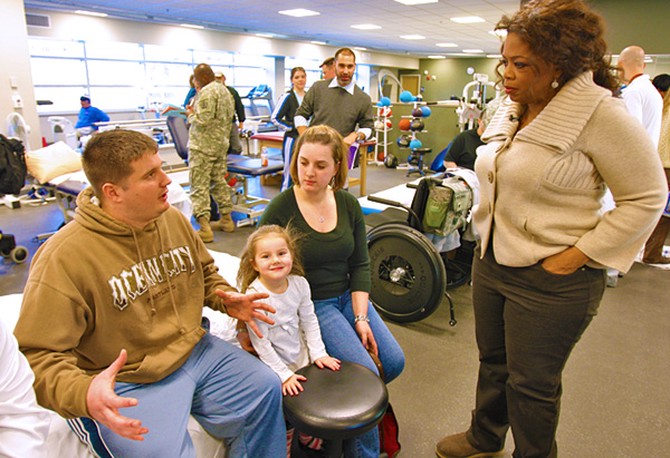
Army National Guard Sgt. Travis Ryan Wood doesn't regret January 15, 2007—the day he was injured in Southern Afghanistan. Instead, he honors it. "Just to celebrate the day that, you know, we could have gone the other way, but we didn't," he says. "So we all call it our 'alive day.'"
Watch Travis tell his story.
The 25-year-old from Cedar City, Utah, was hit by three anti-tank mines while on a recovery mission. "The blast went through the hull of my wrecker and penetrated through," he says. "I was trying to scream, but I couldn't because it hurt really bad. I remember the fire around me. I don't really remember getting loaded into the helicopter, but I remember looking at the guy inside the helicopter, trying to take my breathing mask off because I felt like I was suffocating. And then after that, I lapsed into a coma and then I was out for, like, 12 days."
The injuries Travis sustained were severe. "My pelvis was crushed in multiple places. I broke three vertebrae in my back. I broke three ribs—one rib punctured my right lung. Broke my sternum. My right hip got shredded from shrapnel," he says.
On January 19, Travis woke up at Walter Reed, where he's been ever since with his wife, Stephanie, and 4-year-old daughter, Madeline, by his side. "Half her life she's been here at Walter Reed," Travis says.
Despite the challenges he faces, Travis remains optimistic. "We just got done with our 84th surgery, and it was a breeze for us. It's more like riding a bike now, you know?" he says.
Stephanie agrees. "You learn to adjust. There are days where you do despair and the only way you can get through it is through a higher power. Just that's the only way—and my sweet little angel [Madeline]."
Watch Travis tell his story.
The 25-year-old from Cedar City, Utah, was hit by three anti-tank mines while on a recovery mission. "The blast went through the hull of my wrecker and penetrated through," he says. "I was trying to scream, but I couldn't because it hurt really bad. I remember the fire around me. I don't really remember getting loaded into the helicopter, but I remember looking at the guy inside the helicopter, trying to take my breathing mask off because I felt like I was suffocating. And then after that, I lapsed into a coma and then I was out for, like, 12 days."
The injuries Travis sustained were severe. "My pelvis was crushed in multiple places. I broke three vertebrae in my back. I broke three ribs—one rib punctured my right lung. Broke my sternum. My right hip got shredded from shrapnel," he says.
On January 19, Travis woke up at Walter Reed, where he's been ever since with his wife, Stephanie, and 4-year-old daughter, Madeline, by his side. "Half her life she's been here at Walter Reed," Travis says.
Despite the challenges he faces, Travis remains optimistic. "We just got done with our 84th surgery, and it was a breeze for us. It's more like riding a bike now, you know?" he says.
Stephanie agrees. "You learn to adjust. There are days where you do despair and the only way you can get through it is through a higher power. Just that's the only way—and my sweet little angel [Madeline]."
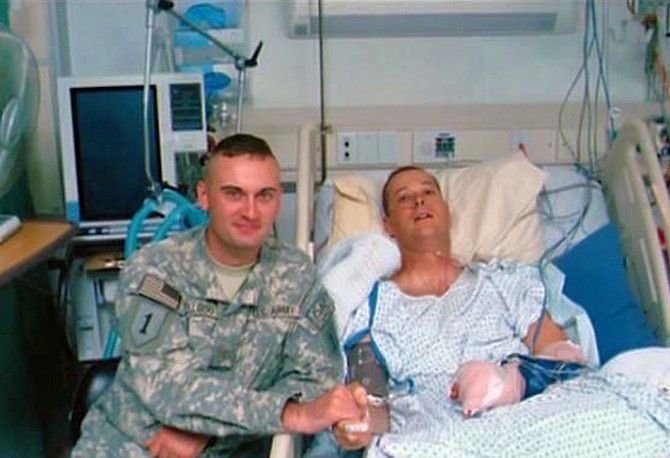
As a medic, Sgt. Kelly "Special K" Keck often went above and beyond to help others. But on September 13, 2008, he stepped on a land mine while helping his fellow soldiers, who had been wounded by a roadside bomb. Kelly lost part of his leg.
"When it happened, I knew right then. It was kind of like I looked down [and thought], 'Oh, my leg's gone,' and my hand was over here and I reached over to grab my leg and, like, 'Oh, some of my fingers are gone,'" he says. "And it's like, 'Well, it's not there. I'm going to have to live without and go from there.'"
In November, the 34-year-old was awarded the Purple Heart for his actions, and he has been recovering at Walter Reed since his injury. By his side are his wife, Oxana, and their 3-year-old daughter, Zoya.
Once Kelly realized how badly he was injured, he says he could only think about his younger brother. "He was over there with me. So as they put me on the helicopter, he was at another base than they were taking me to, so I asked them to make sure he was there as soon as I got there," Kelly says. "He was the first one in my family to meet me and greet me and be with me for a few days."
Now that he's stateside, Kelly says he worries about his brother serving overseas. Still, he's grateful his brother was there when he needed him most. "I thought, of course, [with him] being the younger brother, that I would be taking care of him," Kelly says. "But he took care of me for a few days."
"When it happened, I knew right then. It was kind of like I looked down [and thought], 'Oh, my leg's gone,' and my hand was over here and I reached over to grab my leg and, like, 'Oh, some of my fingers are gone,'" he says. "And it's like, 'Well, it's not there. I'm going to have to live without and go from there.'"
In November, the 34-year-old was awarded the Purple Heart for his actions, and he has been recovering at Walter Reed since his injury. By his side are his wife, Oxana, and their 3-year-old daughter, Zoya.
Once Kelly realized how badly he was injured, he says he could only think about his younger brother. "He was over there with me. So as they put me on the helicopter, he was at another base than they were taking me to, so I asked them to make sure he was there as soon as I got there," Kelly says. "He was the first one in my family to meet me and greet me and be with me for a few days."
Now that he's stateside, Kelly says he worries about his brother serving overseas. Still, he's grateful his brother was there when he needed him most. "I thought, of course, [with him] being the younger brother, that I would be taking care of him," Kelly says. "But he took care of me for a few days."
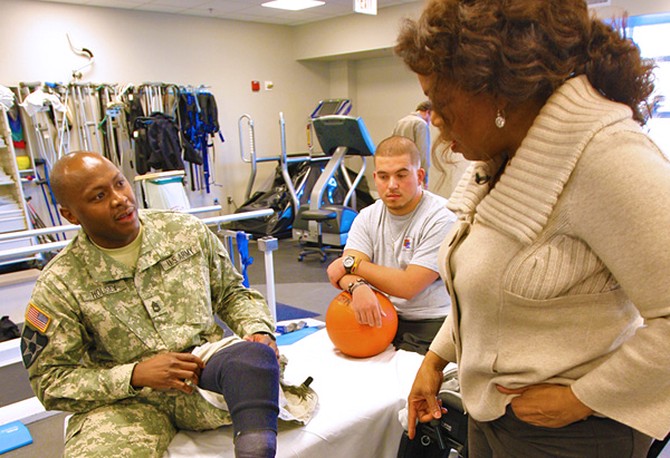
Sgt. First Class Johnathan "Jay" Holsey is all too familiar with the struggles soldiers like Travis and Kelly face in recovery. On November 10, 2004, the father of two was delivering mail and personal items in Ramadi, Iraq. His convoy was hit by a roadside bomb, and Johnathan lost his left leg.
Johnathan hasn't let that day—or his injury—hold him back. Just one year after his injury, he finished the New York City marathon. "Even at work sometimes when I got promoted, a lot of people didn't know I was an amputee until it was told at the promotion ceremony," he says. "I think that just shows the type of help I've gotten here."
But his road to recovery wasn't always easy, and Johnathan shares his own struggles with the men and women who are working through their own recoveries. "I think I went through depression," he says. "And even now I still have days where I'm happy, I'm sad, but I've learned to try to deal with it and press forward."
Watch Johnathan describe his journey.
There's one thing Johnathan tells every wounded soldier to do—cry. "You have to cry and let it go. And from there, you'll be so surprised at how much stronger you can get and just overcome a lot of things you go through," he says. "Sometimes it's easier when you talk to someone who has kind of been through what you're going through. So when I tell him I cry—and I cried for many nights—he can say, 'You know, I did the same thing.' And I cry by myself, you know."
Through it all, Johnathan strongly believes everyone is alive for a reason. "November 10, 2004—that could have been it. I think we all have a purpose," Johnathan says. "And so I don't look at that as a day of hurt or a day of sorrow, you know. I look at it as a day of celebration because I'm still here."
Johnathan hasn't let that day—or his injury—hold him back. Just one year after his injury, he finished the New York City marathon. "Even at work sometimes when I got promoted, a lot of people didn't know I was an amputee until it was told at the promotion ceremony," he says. "I think that just shows the type of help I've gotten here."
But his road to recovery wasn't always easy, and Johnathan shares his own struggles with the men and women who are working through their own recoveries. "I think I went through depression," he says. "And even now I still have days where I'm happy, I'm sad, but I've learned to try to deal with it and press forward."
Watch Johnathan describe his journey.
There's one thing Johnathan tells every wounded soldier to do—cry. "You have to cry and let it go. And from there, you'll be so surprised at how much stronger you can get and just overcome a lot of things you go through," he says. "Sometimes it's easier when you talk to someone who has kind of been through what you're going through. So when I tell him I cry—and I cried for many nights—he can say, 'You know, I did the same thing.' And I cry by myself, you know."
Through it all, Johnathan strongly believes everyone is alive for a reason. "November 10, 2004—that could have been it. I think we all have a purpose," Johnathan says. "And so I don't look at that as a day of hurt or a day of sorrow, you know. I look at it as a day of celebration because I'm still here."
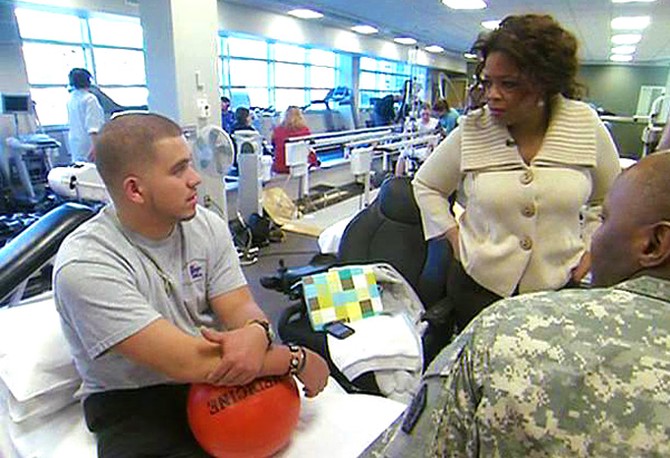
When Oprah meets Staff Sgt. Juan D. Roldan, the 24-year-old is two years and 20 days into his recovery at Walter Reed. A roadside bomb took both of his legs on December 29, 2006. Juan says his inspiration to keep going is his 21-month-old daughter.
Meeting officers like Johnathan, Juan says, helps to show him what he can achieve. "My experience here has been a little frustrating because everybody's injuries are different. So sometimes I do go through depression seeing other guys on the parallel bars taking their first steps and me still being on a mat," he says. "But I'm going to get there."
Meeting officers like Johnathan, Juan says, helps to show him what he can achieve. "My experience here has been a little frustrating because everybody's injuries are different. So sometimes I do go through depression seeing other guys on the parallel bars taking their first steps and me still being on a mat," he says. "But I'm going to get there."
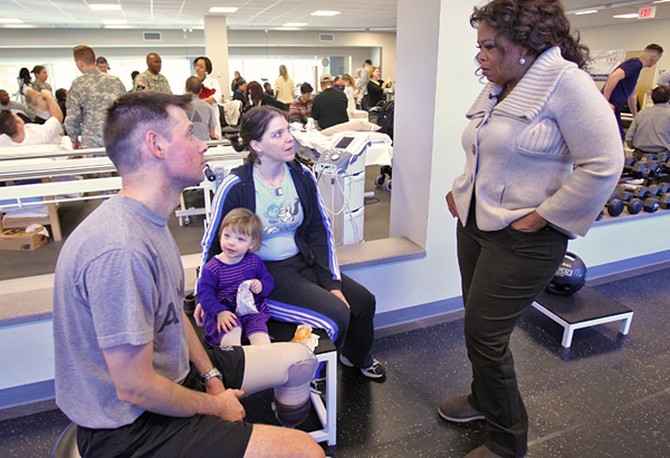
Despite her husband's serious injuries, Sarah Gannaway says her husband's arrival at Walter Reed on December 25, 2007, was the best Christmas present she's ever received. "He looked better than I'd ever seen him—busted to pieces, all kinds of bruised, covered in bandages—but he looked fabulous," she says.
On December 21, 2007, Major Bruce Gannaway was serving his second tour in Iraq when he stepped on a roadside bomb. "I remember a flash of light at my feet and feeling a lot of heat and falling over. And then I felt a big wave of pain," he says. Bruce had lost his left foot and his left middle finger. His left forearm had to be plated, and shrapnel had nicked the femoral vein in his right thigh.
Since their Christmas Day reunion, Bruce and Sarah have lived at Walter Reed with their 2-year-old daughter, Helen Grace. "Helen Grace was 11 months old when Bruce was injured," Sarah says. "She's not going to have a memory of her dad having two legs."
Along with Bruce's physical challenges, the couple is also working to overcome new obstacles in their relationship. "If he wakes up in the middle of the night, he has a choice. He can get in his wheelchair to go to the bathroom, he can get on his crutches or he can crawl. Which is okay if you're going 5 feet to the bathroom," Sarah says. "But if you need to go upstairs and tend to a baby, it's more of a challenge. And so you know, consequently, it's me. Most of the time it's me."
Bruce acknowledges the new hardships—but says they aren't necessarily a bad thing. "I know this injury has affected our marriage, but in many ways, I think it's challenged us and given us a chance to improve it and get closer together," he says.
No matter what, Bruce's family is behind him with every step of his recovery. When he receives a new prosthetic, Helen Grace offers her own expertise. "She's gotten ahold of an Allen wrench at times, and she'll come up and basically want to adjust my foot," Bruce says.
Sarah and Bruce, however, have their own test for each new prosthetic. "One of the ways we test the foot out to make sure it's working right is we will dance," he says.
Watch Sarah and Bruce dance.
"It's just an opportunity for us to cuddle," Sarah says.
On December 21, 2007, Major Bruce Gannaway was serving his second tour in Iraq when he stepped on a roadside bomb. "I remember a flash of light at my feet and feeling a lot of heat and falling over. And then I felt a big wave of pain," he says. Bruce had lost his left foot and his left middle finger. His left forearm had to be plated, and shrapnel had nicked the femoral vein in his right thigh.
Since their Christmas Day reunion, Bruce and Sarah have lived at Walter Reed with their 2-year-old daughter, Helen Grace. "Helen Grace was 11 months old when Bruce was injured," Sarah says. "She's not going to have a memory of her dad having two legs."
Along with Bruce's physical challenges, the couple is also working to overcome new obstacles in their relationship. "If he wakes up in the middle of the night, he has a choice. He can get in his wheelchair to go to the bathroom, he can get on his crutches or he can crawl. Which is okay if you're going 5 feet to the bathroom," Sarah says. "But if you need to go upstairs and tend to a baby, it's more of a challenge. And so you know, consequently, it's me. Most of the time it's me."
Bruce acknowledges the new hardships—but says they aren't necessarily a bad thing. "I know this injury has affected our marriage, but in many ways, I think it's challenged us and given us a chance to improve it and get closer together," he says.
No matter what, Bruce's family is behind him with every step of his recovery. When he receives a new prosthetic, Helen Grace offers her own expertise. "She's gotten ahold of an Allen wrench at times, and she'll come up and basically want to adjust my foot," Bruce says.
Sarah and Bruce, however, have their own test for each new prosthetic. "One of the ways we test the foot out to make sure it's working right is we will dance," he says.
Watch Sarah and Bruce dance.
"It's just an opportunity for us to cuddle," Sarah says.
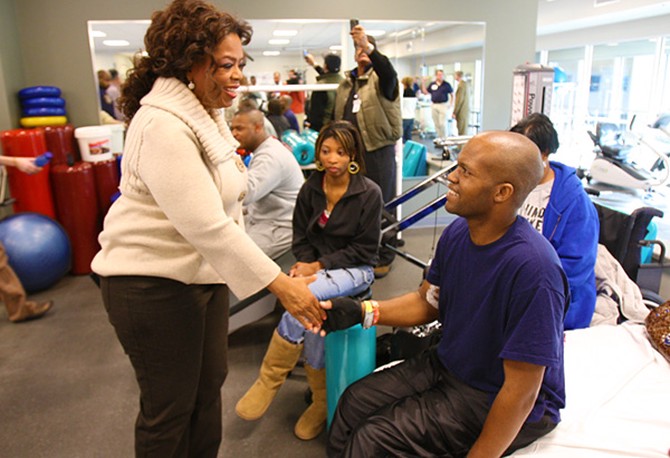
A husband and father of three, Sgt. First Class Neal "Smoke" Boyd has served in the military for 19 years. On November 8, 2008, Neal was hurt while clearing a building. "I got blown on the backside," he says.
Eight weeks after his arrival at Walter Reed, Neal meets Oprah. "I'm dealing with it," he says. "I wake up and just keep pushing forward."
Eight weeks after his arrival at Walter Reed, Neal meets Oprah. "I'm dealing with it," he says. "I wake up and just keep pushing forward."
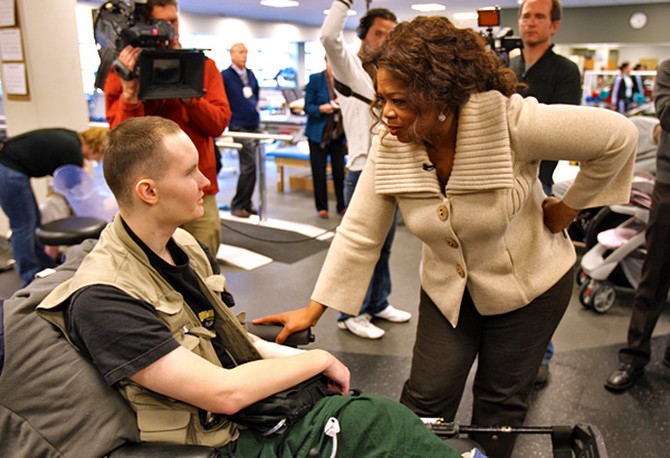
Since his "alive date" on August 21, 2007, Sgt. John Hoxie says his rehabilitation has been progressing slowly, but he's making progress. Despite the pain and road he has ahead of him, John says he wouldn't hesitate to do everything over again.
"Thank you for serving our country," Oprah says. "Thank you."
"Thank you for serving our country," Oprah says. "Thank you."
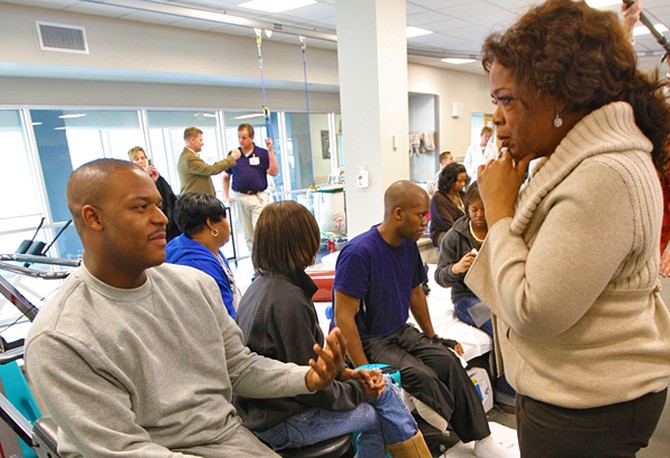
On June 25, 2008, Marine Corps Lance Cpl. Justin "Nate" Knowles was on patrol in Afghanistan when he stepped on a pressured plate IED explosive. "I saw my leg when I got blown up," he says. "Then I got back to the States a couple days later, and they told me they had to take my leg."
Nate says he's adjusting the best he can. "It's not too bad. Once you get over the fact that you already lost your leg, it's not too bad," he says.
When the recovery process becomes difficult, Nate's got some cute and cuddly motivation—his 3-month-old daughter, Jada.
Nate says he's adjusting the best he can. "It's not too bad. Once you get over the fact that you already lost your leg, it's not too bad," he says.
When the recovery process becomes difficult, Nate's got some cute and cuddly motivation—his 3-month-old daughter, Jada.
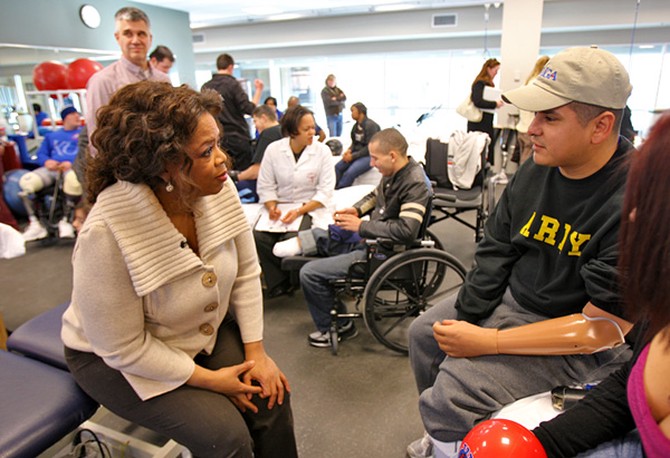
On July 2, 2007, Staff Sgt. Ramon Padilla was injured in a mortar attack in Afghanistan. Even though he suffered traumatic brain injury and had his left arm severed, the father of four says he would do it all again.
"I came in the Army to defend my family and the people that live here and that was my job," he says. "Everybody knows that going in there's a chance we might go to war and stuff like that, but we were trained, and that's what we do. That's what we signed up to do."
"I came in the Army to defend my family and the people that live here and that was my job," he says. "Everybody knows that going in there's a chance we might go to war and stuff like that, but we were trained, and that's what we do. That's what we signed up to do."
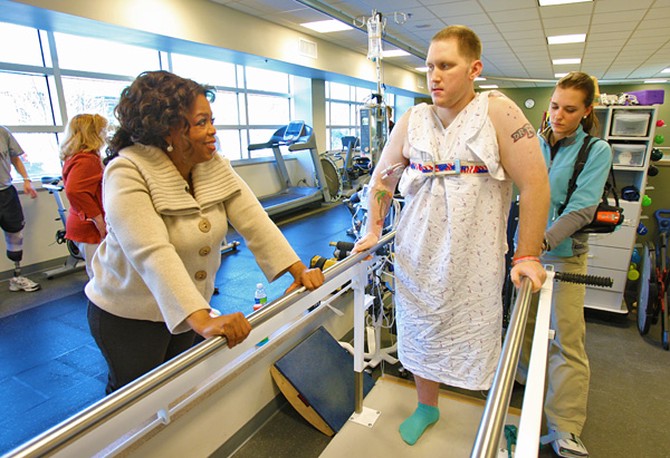
Specialist Robert Andrzejczak lost his leg in a grenade attack in Iraq only two weeks before Oprah's visit to Walter Reed. But with his mom, Cookie, by his side, the 22-year-old supported himself on a set of parallel bars, determined to stand for the first time.
"That is amazing," Oprah says. "Second day out of bed. First day getting up out of the chair."
"And standing," Robert says.
So how does it feel? "Painful, actually," he says. "But you've got to get used to it."
With Oprah and her crew nearby, Robert tries standing a second time.
"Getting used to it now," he says. "But it's still a little painful just from being in bed for so long because the other leg, it feels like all of the blood is rushing right to it."
For Robert, this is only the first stop on a long journey. "It's all steps, and this is the first one. So Step 1 is done and ready to move on," he says. "Not looking forward to some of them."
Still, Robert says he only needs to look around the room to find the inspiration he needs to keep going. "Eventually, I'll be catching up to some of these other guys," he says. "Some of the guys with the prosthetics [are] running around here and doing all types of different exercises and walking like it's no problem at all. It's definitely motivating. That's where I want to be."
"That is amazing," Oprah says. "Second day out of bed. First day getting up out of the chair."
"And standing," Robert says.
So how does it feel? "Painful, actually," he says. "But you've got to get used to it."
With Oprah and her crew nearby, Robert tries standing a second time.
"Getting used to it now," he says. "But it's still a little painful just from being in bed for so long because the other leg, it feels like all of the blood is rushing right to it."
For Robert, this is only the first stop on a long journey. "It's all steps, and this is the first one. So Step 1 is done and ready to move on," he says. "Not looking forward to some of them."
Still, Robert says he only needs to look around the room to find the inspiration he needs to keep going. "Eventually, I'll be catching up to some of these other guys," he says. "Some of the guys with the prosthetics [are] running around here and doing all types of different exercises and walking like it's no problem at all. It's definitely motivating. That's where I want to be."
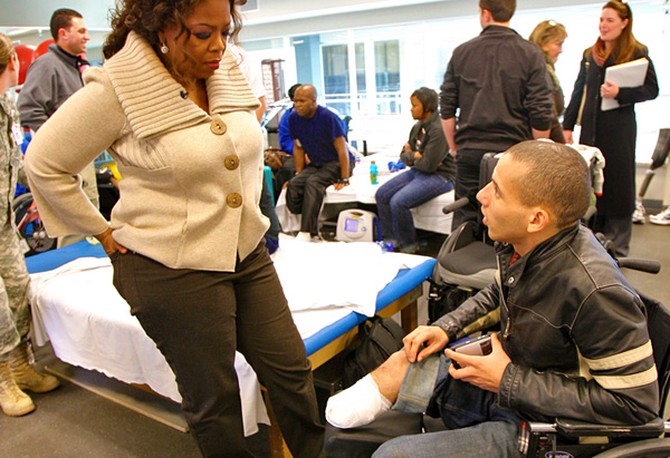
Navy Petty Officer Third Class Thomas John McBride was serving as a medic and combat adviser in a dangerous part of Afghanistan when a devastating mortar strike killed one of his squad mates, injured several others and damaged his leg beyond repair.
Thomas was hurt on October 16, 2008, and had his leg amputated on October 30. "[The doctors] kind of braced me for it. When I was sent to Germany to get fixed, they kind of mentioned it," he says. "And then when I got here, they were like, 'It seems like the most likely choice.'"
In the end, Thomas says he made the decision to let his leg go. "I personally asked them when I got amputated if they would just kind of leave my leg covered when I got back to the bed so when I'm ready for it, I can look at it," he says. "And they respected that. I really appreciated that."
"That's a moment, I can imagine," Oprah says.
"Yes, ma'am," he says.
Thomas was hurt on October 16, 2008, and had his leg amputated on October 30. "[The doctors] kind of braced me for it. When I was sent to Germany to get fixed, they kind of mentioned it," he says. "And then when I got here, they were like, 'It seems like the most likely choice.'"
In the end, Thomas says he made the decision to let his leg go. "I personally asked them when I got amputated if they would just kind of leave my leg covered when I got back to the bed so when I'm ready for it, I can look at it," he says. "And they respected that. I really appreciated that."
"That's a moment, I can imagine," Oprah says.
"Yes, ma'am," he says.
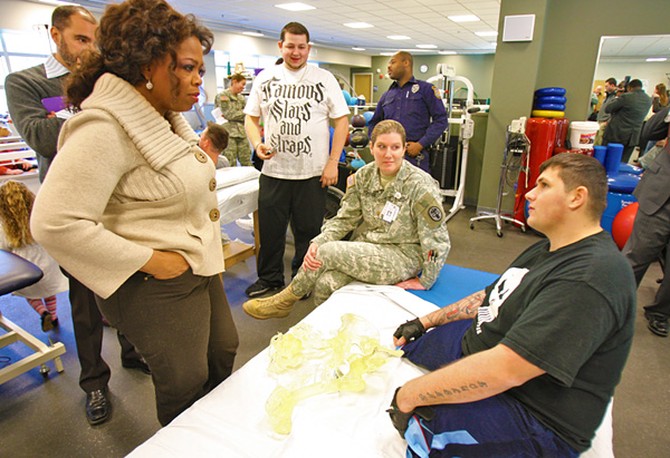
Specialist Nicholas Koulchar says he was in the wrong place at the wrong time when the vehicle he was riding in was hit by an explosive device in Iraq. On August 25, 2008, the 26-year-old lost both legs and suffered a shattered pelvis.
"There was a distinct moment, like when I first got hit, I thought the vehicle rocked. And I thought maybe just the concussion of the blast just broke a leg or something like that. And then I tried to move and I fell backward," he says. "It was at that moment in time whenever your foot's over here and you've got big chunks of meat and your sergeant's, like, 'I've got to get out,' and I'm, like, 'Just crawl over me.' And he's telling me I'm screwed."
In the moment, Nicholas says he had to make peace with the situation. "Well, seriously, you start panicking, and that's how you die," he says. "I probably wouldn't be here today if I had freaked out."
Nicholas says he told himself over and over that he couldn't die. "I didn't want to have my little brother have to bury me. And he's the only family that I have and I'm the only family he has really, and I wasn't about to die and leave him alone."
See what special request Nicholas had for Oprah.
"There was a distinct moment, like when I first got hit, I thought the vehicle rocked. And I thought maybe just the concussion of the blast just broke a leg or something like that. And then I tried to move and I fell backward," he says. "It was at that moment in time whenever your foot's over here and you've got big chunks of meat and your sergeant's, like, 'I've got to get out,' and I'm, like, 'Just crawl over me.' And he's telling me I'm screwed."
In the moment, Nicholas says he had to make peace with the situation. "Well, seriously, you start panicking, and that's how you die," he says. "I probably wouldn't be here today if I had freaked out."
Nicholas says he told himself over and over that he couldn't die. "I didn't want to have my little brother have to bury me. And he's the only family that I have and I'm the only family he has really, and I wasn't about to die and leave him alone."
See what special request Nicholas had for Oprah.
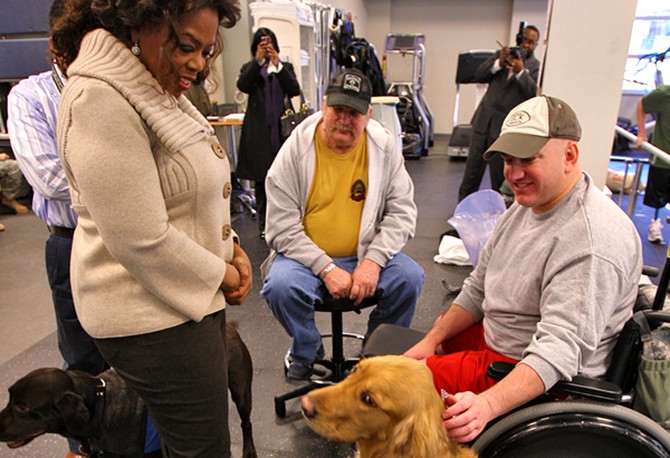
Sgt. Paul "Mac" McAlister II spent his time on the front lines uncovering hidden explosives. Having already served 10 years in the military, Paul was just doing his job on March 31, 2008, when he was hit.
At first, Paul says he didn't realize he was hurt. "I was like, 'Why can't I stop this truck?' So I put it in neutral and I put it in park, and I felt my leg and it felt like hamburger. So I flicked on the light and I looked down and there it was, just all raw basically," he says. "It was quite the experience. It felt like a thousand bees all at once just stinging right on the end of the legs."
Watch Paul tell his story.
In his 10 months at Walter Reed, Paul says he's had a lot of time to put things in perspective. He says he spent a few weeks thinking about the "what ifs" leading up to the accident but chose to move forward instead of looking back. "I think I cope with it very well. It's nobody's fault. It happened. Now it's time to learn to walk again and deal with it."
As Paul gets ready for life outside Walter Reed, he won't be alone—he'll have a trained golden retriever named George by his side. "Once we leave here, we get assigned a dog and we go and train for two weeks with them and then we get the dog and it helps us out in our daily life," Paul says. "Like if we needed to stand steady so that we can get up like if we fell or something, they will stand rather steady to help you up."
"Thank you so much for your service," Oprah says.
How you can help soldiers at Walter Reed—and in your own community
At first, Paul says he didn't realize he was hurt. "I was like, 'Why can't I stop this truck?' So I put it in neutral and I put it in park, and I felt my leg and it felt like hamburger. So I flicked on the light and I looked down and there it was, just all raw basically," he says. "It was quite the experience. It felt like a thousand bees all at once just stinging right on the end of the legs."
Watch Paul tell his story.
In his 10 months at Walter Reed, Paul says he's had a lot of time to put things in perspective. He says he spent a few weeks thinking about the "what ifs" leading up to the accident but chose to move forward instead of looking back. "I think I cope with it very well. It's nobody's fault. It happened. Now it's time to learn to walk again and deal with it."
As Paul gets ready for life outside Walter Reed, he won't be alone—he'll have a trained golden retriever named George by his side. "Once we leave here, we get assigned a dog and we go and train for two weeks with them and then we get the dog and it helps us out in our daily life," Paul says. "Like if we needed to stand steady so that we can get up like if we fell or something, they will stand rather steady to help you up."
"Thank you so much for your service," Oprah says.
How you can help soldiers at Walter Reed—and in your own community
Published 02/26/2009

